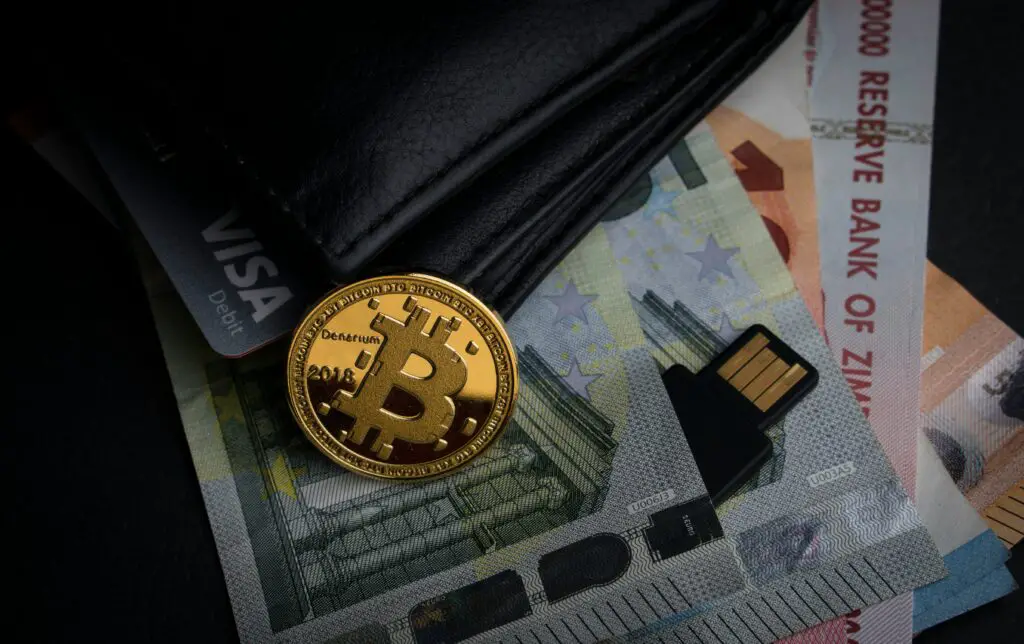BITCOIN VS. TRADITIONAL BANKING: WHY CRYPTOCURRENCY IS THE FUTURE?
Cryptocurrencies, Especially Bitcoin, Have Emerged As A Disruptive Force In The Financial Landscape, Challenging The Traditional Banking System. As We Go Through The Emerging Dynamics Of Currency, It Becomes Clear That The Future May Be More Decentralized And Technologically Driven. Let’s Look At A Comparison Between Bitcoin And Traditional Banking To Understand Why Cryptocurrencies Are Gaining Popularity.

DEVELOPMENT OF CURRENCY SYSTEMS
In The World Of Finance, Traditional Banking Has Been The Foundation Of Our Economic Systems. However, With The Advent Of Bitcoin, A Decentralized Form Of Currency, We Are Seeing A Paradigm Shift. Traditional Banking Relies On Centralized Control, While Bitcoin Operates On A Peer-To-Peer Network, Allowing Users To Transact Directly Without Intermediaries.
BENEFITS OF CRYPTOCURRENCY
Decentralization And Peer-To-Peer Transactions
A Major Advantage Of Cryptocurrency Is Its Decentralized Nature. Unlike Traditional Banks, Which Operate Under Central Authorities, Bitcoin Transactions Occur Directly Between Users, Providing A Level Of Autonomy And Freedom.
SECURITY AND TRANSPARENCY FEATURES
Blockchain Technology, The Backbone Of Cryptocurrencies, Ensures Secure And Transparent Transactions. Decentralized Ledger Systems Reduce The Risk Of Fraud And Increase Accountability, Eliminating Concerns Prevalent In Traditional Banking.
Low Transaction Costs
Cryptocurrency Transactions Often Come With Lower Fees Than Traditional Banking. The Absence Of Middlemen Streamlines The Process, Making It Cost-Effective For Users.

CHALLENGES OF TRADITIONAL BANKING
CENTRALIZED CONTROL AND REGULATORY BARRIERS
Traditional Banks Are Subject To Centralized Control And Strict Regulations. Bitcoin, On The Other Hand, Operates Independently Of Any Central Authority, Giving Users More Control Over Their Financial Transactions.
LENGTHY TRANSACTION PROCESSES
Traditional Banking Transactions Can Take Time, Especially For International Transfers. Cryptocurrencies, With Their Decentralized And Borderless Nature, Facilitate Faster And More Efficient Transactions.

ACCESS ISSUES FOR UNBANKED POPULATIONS
A Significant Challenge In Traditional Banking Is The Lack Of Access To The Unbanked Population. Cryptocurrencies Have The Potential To Bridge This Gap By Providing Financial Services To Those Excluded From The Traditional Banking System.
BITCOIN’S IMPACT ON THE FINANCIAL LANDSCAPE
The Rise Of Bitcoin Has Been Tremendous, With Increasing Acceptance Across Various Sectors. Major Companies Are Integrating Cryptocurrencies Into Their Operations, Signaling A Change In The Financial Landscape. This Changing Perspective Challenges The Traditional Role Of Traditional Banks.

SECURITY AND TRANSPARENCY IN CRYPTOCURRENCY
BLOCKCHAIN TECHNOLOGY AND ITS ROLE
Blockchain, The Technology Behind Bitcoin, Ensures Security By Creating An Immutable Ledger. This Innovation Has The Potential To Revolutionize The Way Data Is Stored And Transactions Are Conducted.
REDUCTION IN FRAUD AND INCREASE IN ACCOUNTABILITY
Cryptocurrencies Reduce Fraud Through Cryptographic Techniques. The Transparency Of Blockchain Technology Provides A Verifiable Record Of Transactions, Increasing Accountability And Trust.

CRYPTOCURRENCY ADOPTION RATES
The Adoption Of Cryptocurrencies Is Increasing Globally. Factors Such As Financial Instability, Inflation Concerns, And The Desire For Financial Privacy Contribute To The Growing Popularity Of Bitcoin And Other Cryptocurrencies.
REGULATORY LANDSCAPE
It Is Important To Understand The Regulatory Environment For Both Traditional Banking And Cryptocurrencies. While Traditional Banking Operates Within Established Frameworks, Cryptocurrencies Face A More Fluid Regulatory Landscape. Future Developments In Regulation Will Play An Important Role In Shaping The Coexistence Of These Two Systems.

INVESTMENT OPPORTUNITIESINVESTMENT OPPORTUNITIES
Cryptocurrency As An Investment Avenue
Cryptocurrencies, Especially Bitcoin, Have Become Attractive Investment Options. The Potential For Substantial Returns Has Attracted The Attention Of Investors Looking For Alternatives To Traditional Banking Investments.
RISKS AND REWARDS COMPARED TO TRADITIONAL BANKING INVESTMENTS
Investing In Cryptocurrencies Comes With Its Own Risks, Including Market Volatility. It Is Essential To Compare The Risks And Rewards Against Traditional Banking Investments To Make An Informed Decision.
PUBLIC PERCEPTION AND EDUCATION
Common Misconceptions About Bitcoin
The Public’s Perception Of Bitcoin Is Often Influenced By Misconceptions. It Is Important To Address These Misconceptions Through Education To Promote A Better Understanding Of The Benefits And Risks Associated With Cryptocurrencies.
IMPORTANCE OF EDUCATING THE PUBLIC
Educating The Public About Cryptocurrencies Is Paramount. Increased Awareness Will Help In Taking Informed Decisions And Ensure Responsible Participation

FUTURE SCENARIO: NAVIGATING BITCOIN’S JOURNEY
INTRODUCTION
In The Ever-Evolving Landscape Of Finance, Bitcoin Stands As A Symbol Of Change, Challenging The Traditional Norms Of Banking. As We Explore The Different Aspects Of This Digital Currency, It Becomes Clear That A Significant Change Is Underway, Leading Us To A Future Where Cryptocurrencies Will Play A Significant Role In Reshaping The Financial World.

BITCOIN’S IMPACT ON FINANCIAL INCLUSION
BRIDGING THE GAP FOR THE UNBANKED POPULATION
One Of The Notable Contributions Of Bitcoin Is Its Ability To Bridge The Gap For The Unbanked Population. People In Many Parts Of The World Do Not Have Access To Basic Financial Services. Cryptocurrencies, With Their Decentralized Nature, Provide A Solution, Allowing Anyone With An Internet Connection To Participate In The Global Economy.
EMPOWERING INDIVIDUALS THROUGH DECENTRALIZED FINANCE
Decentralized Finance (Defi) Powered By Blockchain Technology Is Gaining Popularity. The Goal Of This Movement Is To Create A More Inclusive Financial Ecosystem, Empowering Individuals By Giving Them More Control Over Their Financial Decisions. Through Defi Platforms, Users Can Access Lending, Borrowing, And Other Financial Services Without Relying On Traditional Banks.

ADAPTATION BY BUSINESSES: A PARADIGM SHIFT
INTEGRATION OF BITCOIN INTO OPERATIONS
Businesses Are Recognizing The Transformative Potential Of Bitcoin And Actively Integrating It Into Their Operations. From Small Enterprises To Major Corporations, The Acceptance Of Cryptocurrencies Is Reshaping Business Transactions.
IMPACT ON CUSTOMER TRANSACTIONS AND EXPERIENCES
The Integration Of Bitcoin Is Not Only Streamlining Processes But Also Enhancing Customer Experiences. Faster And More Cost-Effective Transactions Contribute To Better Satisfaction, A Departure From Traditional, Sometimes Cumbersome, Banking Experiences.
POTENTIAL RISKS OF CRYPTOCURRENCY: DEALING WITH THE CHALLENGES

MARKET VOLATILITY AND PRICE FLUCTUATIONS
While The Potential For Significant Returns Is Attractive, The Market Volatility Of Cryptocurrencies, Including Bitcoin, Is A Notable Risk. Investors Should Weigh These Fluctuations Carefully, Understanding That The Value Of Digital Assets Can Be Subject To Rapid And Unpredictable Changes.
REGULATORY UNCERTAINTIES AND POTENTIAL PITFALLS
The Regulatory Landscape For Cryptocurrencies Is Evolving. Dealing With Regulatory Uncertainties And Potential Pitfalls Is Vital For The Continued Growth Of This Market. Continued Collaboration Between Industry Stakeholders And Regulatory Bodies Is Essential To Ensure A Balanced And Safe Environment For Users And Investors.

CONCLUSION: EMBRACING THE CRYPTOCURRENCY REVOLUTION
In Conclusion, The Comparison Between Bitcoin And Traditional Banking Is Not A Battle For Dominance, But A Story Of Coexistence And Growth. Cryptocurrencies, With Their Inherent Benefits Of Decentralization, Security, And Accessibility, Are Carving Out A Niche In The Financial Ecosystem.
As We Embrace The Cryptocurrency Revolution, It Is Essential To Acknowledge That Both Bitcoin And Traditional Banking Can Complement Each Other. While Traditional Banking Offers Stability And Familiarity, Bitcoin Brings Innovation And Inclusivity To The Forefront. The Future Promises A Harmonious Blend Of These Financial Systems, Offering Users A Wide Variety Of Options To Suit Their Preferences And Needs.
